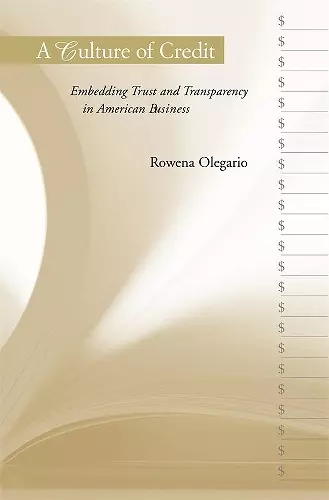A Culture of Credit
Embedding Trust and Transparency in American Business
Format:Hardback
Publisher:Harvard University Press
Published:30th Nov '06
Currently unavailable, and unfortunately no date known when it will be back

Rowena Olegario has filled an important gap in American business history. A Culture of Credit is a straightforward, clearly written study of an important and understudied question: how did creditworthiness come to be determined in American mercantile trade? In this fascinating and informative history, Olegario illuminates much that was unknown about the workings of nineteenth-century commercial credit. Even more interestingly, she draws our attention to a difficult cultural problem that is often taken for granted by people with little business experience but is always of immense importance to creditors-the problem of "trust" and "transparency" in business dealings. -- Lendol Calder, Augustana College With great originality, Rowena Olegario brings together a wide variety of sources and weaves them into a compelling story about embedding trust and transparency in American business. All in all, this is a superb contribution to business history. -- Richard Sylla, New York University
In the growing and dynamic economy of nineteenth-century America, businesses sold vast quantities of goods to one another, mostly on credit. This book explains how business people solved the problem of whom to trust—how they determined who was deserving of credit, and for how much.
In the growing and dynamic economy of nineteenth-century America, businesses sold vast quantities of goods to one another, mostly on credit. This book explains how business people solved the problem of whom to trust--how they determined who was deserving of credit, and for how much. In the process, a business system based largely on information circulating through personal networks became dependent on more formalized methods and institutions. First to appear in the 1830s was the credit reporting agency, whose pioneers included the abolitionist Lewis Tappan, and businessmen John Bradstreet and Robert G. Dun (whose firms merged in 1933 to form Dun & Bradstreet). Later, groups of business creditors formed interchanges and bureaus to share information on their customers' payment records. In 1896, the National Association of Credit Men was established, and by 1920, credit men had established both a national credit information clearinghouse and a bureau for American exporters.
These developments forced American businesses, large and small, to make their financial situations more transparent to creditors and credit reporting firms. Rowena Olegario traces the way resistance, mutual suspicion, skepticism, and legal challenges were overcome in the relentless quest to make information on business borrowers more accurate and available.
Rowena Olegario has filled an important gap in American business history. A Culture of Credit is a straightforward, clearly written study of an important and understudied question: how did creditworthiness come to be determined in American mercantile trade? In this fascinating and informative history, Olegario illuminates much that was unknown about the workings of nineteenth-century commercial credit. Even more interestingly, she draws our attention to a difficult cultural problem that is often taken for granted by people with little business experience but is always of immense importance to creditors—the problem of "trust" and "transparency" in business dealings. -- Lendol Calder, Augustana College
With great originality, Rowena Olegario brings together a wide variety of sources and weaves them into a compelling story about embedding trust and transparency in American business. All in all, this is a superb contribution to business history. -- Richard Sylla, New York University
This incisive monograph retraces the emergence and maturation of the two largest American credit reporting firms, the Mercantile Agency, which became R. G. Dun and Company, and J. M. Bradstreet. Rowena Olegario shows how those dominant innovators tackled the fundamental problem of asymmetric information in mercantile trade...[T]his engaging book is a model of how to probe an evolving economic culture through a pivotal institution of modern capitalism and should receive close attention from business, social, and cultural historians of industrializing America. -- Edward Balleisen * Journal of American History *
- Nominated for Ellis W. Hawley Prize 2007
- Nominated for OAH Frederick Jackson Turner Award 2007
- Nominated for John G. Cawelti Award 2007
- Nominated for Hagley Prize in Business History 2007
- Nominated for John H. Dunning Prize 2007
ISBN: 9780674023406
Dimensions: 235mm x 156mm x 17mm
Weight: unknown
288 pages